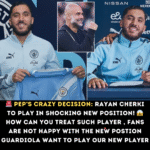Are Manchester City slowly opening the door to sign their top target for the right-back position?

Manchester City’s summer transfer window has been one of calculated precision and strategic reinforcement. With Pep Guardiola entering another campaign at the helm of the Citizens, the club has demonstrated their commitment to maintaining their position at the pinnacle of English and European football through shrewd acquisitions and tactical planning. The confirmation that Ederson will remain between the posts for another season has provided stability in goal, while the arrivals of Rayan Ait-Nouri, Rayan Cherki, Marcus Bettinelli, and Tijjani Reijnders have addressed various areas of the squad that required attention.
However, as the transfer window progresses toward its conclusion, one glaring omission remains in Manchester City’s otherwise comprehensive squad overhaul. The right-back position has emerged as the singular area where Guardiola’s team lacks the depth and quality that characterizes every other department of their roster. This deficiency has not gone unnoticed by the club’s hierarchy, and their attention has increasingly focused on one particular target who could provide the solution to this tactical conundrum.
The Right-Back Conundrum
The importance of the full-back positions in Pep Guardiola’s tactical philosophy cannot be overstated. Throughout his illustrious managerial career, from his revolutionary period at Barcelona through his transformative years at Bayern Munich and now his sustained success at Manchester City, Guardiola has consistently relied on technically proficient, tactically intelligent full-backs who can seamlessly transition between defensive solidity and attacking dynamism.
At Manchester City, this positional versatility has been exemplified by players like Joao Cancelo during his peak years at the club, Kyle Walker’s consistent excellence, and the emergence of Rico Lewis as a promising young talent. However, the current state of the right-back position presents challenges that extend beyond mere squad depth. The role demands a player who can operate effectively in Guardiola’s complex tactical system, where full-backs are expected to provide width in attack, invert into midfield when required, maintain defensive discipline, and possess the technical ability to execute the intricate passing patterns that define City’s possession-based approach.
The significance of addressing this position becomes even more apparent when considering the grueling nature of the modern football calendar. With Manchester City competing across multiple fronts including the Premier League, Champions League, FA Cup, and various other competitions, squad rotation becomes not just beneficial but essential for maintaining performance levels throughout the season. The lack of a specialist right-back option limits Guardiola’s tactical flexibility and places additional burden on players who may be required to operate outside their optimal positions.
Tino Livramento: The Identified Solution
Newcastle United’s Tino Livramento has emerged as Manchester City’s primary target for the right-back position, and this interest is far from arbitrary. The young defender represents exactly the type of player that thrives within Guardiola’s system, combining technical proficiency with tactical intelligence and the versatility that has become synonymous with success under the Catalan manager.
Livramento’s journey to becoming one of the most sought-after full-backs in English football has been marked by steady progression and consistent development. His ability to operate effectively on both flanks provides the tactical flexibility that Guardiola values highly, while his pace and crossing ability offer the attacking threat necessary in modern full-back play. Perhaps most importantly, his age profile aligns perfectly with Manchester City’s long-term planning, representing both an immediate solution and a foundation for future success.
The Newcastle defender’s technical attributes make him an ideal fit for City’s possession-heavy approach. His comfort on the ball, ability to play short passes under pressure, and understanding of when to make forward runs demonstrate the footballing intelligence that Guardiola demands from his full-backs. These qualities become even more valuable when considering how City’s full-backs are often required to make split-second decisions about whether to maintain width, drift inside to create numerical advantages in midfield, or provide overlapping runs to support the attacking phases of play.
Furthermore, Livramento’s defensive capabilities should not be overlooked. His pace allows him to recover effectively when caught out of position, while his reading of the game and positioning sense demonstrate the defensive maturity necessary to operate at the highest level. These attributes are crucial given that Manchester City’s attacking full-backs are often exposed to counter-attacks when the team loses possession in advanced areas.
The Newcastle Obstacle
While Tino Livramento may represent the ideal solution to Manchester City’s right-back requirements, securing his signature presents significant challenges that extend well beyond simple financial considerations. Newcastle United’s transformation under their new ownership has fundamentally altered the dynamics of the transfer market, particularly when it comes to retaining key players who might previously have been vulnerable to approaches from traditional powerhouses.
Newcastle’s reluctance to entertain offers for Livramento stems from multiple factors that make this potential transfer particularly complex. Firstly, the player represents a significant investment in both sporting and commercial terms for the Magpies. His development potential and current ability make him a cornerstone of their long-term planning, while his marketability and connection with the fanbase add additional layers of value that cannot be easily quantified in monetary terms.
The club’s financial position has also dramatically improved, reducing their dependency on player sales to balance the books. This financial stability allows Newcastle to adopt a more assertive stance in transfer negotiations, particularly when it comes to retaining players they consider essential to their project. The luxury of being able to reject substantial offers provides them with significant leverage in any potential negotiations with Manchester City.
From a tactical perspective, Livramento’s versatility makes him an invaluable asset for Newcastle manager Eddie Howe. His ability to operate effectively at right-back, left-back, and even in more advanced positions provides Howe with tactical flexibility that would be difficult to replace. This versatility becomes even more valuable when considering Newcastle’s aspirations to establish themselves as consistent challengers for European qualification and eventual participation in continental competitions.
The geographical and cultural factors also play a role in Newcastle’s determination to retain Livramento. The player’s integration into the squad, his understanding of the club’s ambitions, and his connection with the local community create intangible bonds that make any potential departure more disruptive than a simple transfer of playing assets.
The Psychological Factor: Head Turned by Interest
Recent reports suggesting that Tino Livramento may have had “his head turned” by Manchester City’s interest introduce a crucial psychological element to this transfer saga. The power of Manchester City’s interest should not be underestimated, particularly for a young player with ambitions of competing at the highest level of European football.
The allure of working under Pep Guardiola represents one of the most compelling aspects of any potential move to Manchester City. Guardiola’s reputation as a tactical innovator and his track record of developing players, particularly those in defensive positions, makes the prospect of joining his squad incredibly attractive for ambitious footballers. The opportunity to learn from one of the greatest managers in football history while competing for the most prestigious trophies in the sport represents a career-defining opportunity that few players would dismiss lightly.
Manchester City’s recent success adds another layer to their appeal. The club’s dominance in domestic competitions, their success in the Champions League, and their consistent presence among European football’s elite make them an attractive destination for players seeking to maximize their career achievements. For Livramento, the opportunity to transition from fighting for European qualification with Newcastle to competing for Premier League titles and Champions League glory with City represents a significant step up in ambition and expectation.
The financial considerations, while not the primary motivation for most professional footballers, cannot be ignored entirely. Manchester City’s ability to offer competitive compensation packages, combined with the commercial opportunities that come with playing for one of the world’s most recognizable football clubs, adds another dimension to the appeal of any potential move.
However, the concept of having one’s “head turned” extends beyond simple attraction to a new opportunity. It suggests a fundamental shift in the player’s mindset, where the possibility of a move begins to influence their commitment to their current situation. This psychological change can create momentum in transfer negotiations, as the player’s desire for a move can sometimes overcome the resistance of their current club.
Current Squad Dynamics and Alternatives
Manchester City’s current options at right-back highlight both the urgency of their need for reinforcement and the high standards expected within Guardiola’s squad. Matheus Nunes has emerged as the most likely candidate to fill the position based on his performances during the FIFA Club World Cup, where his adaptation to the role demonstrated both promise and the inevitable growing pains associated with positional transitions.
Nunes’ background as a central midfielder brings certain advantages to the right-back role, particularly in terms of his comfort in possession and his understanding of Guardiola’s tactical requirements. His technical ability allows him to contribute effectively to City’s build-up play, while his physicality provides the defensive presence necessary to compete against premier-level opposition. However, the transition from midfield to full-back requires specific tactical adjustments and an understanding of defensive responsibilities that can only be fully developed through extensive experience in the position.
The Portuguese international’s performances in the right-back role have shown gradual improvement, suggesting that with continued development, he could provide a viable option for Guardiola’s tactical system. His willingness to adapt to the positional requirements and his commitment to learning the nuances of defensive play demonstrate the professional attitude that Guardiola values highly in his players.
Rico Lewis represents another option within the current squad, bringing youth, energy, and natural defensive instincts to the position. His emergence through Manchester City’s academy system provides him with an innate understanding of the club’s playing philosophy, while his technical development under Guardiola’s guidance has been impressive. However, questions remain about whether Lewis possesses the physical and mental maturity necessary to handle the demands of regular first-team football at the highest level.
Manuel Akanji’s versatility allows him to operate at right-back when tactical circumstances require such flexibility. His experience, defensive reliability, and understanding of Guardiola’s system make him a dependable option for specific matches or tactical situations. However, utilizing Akanji at right-back necessarily weakens City’s central defensive options, creating a tactical compromise that ideally would be avoided through the acquisition of a specialist right-back.
The Financial Reality of Modern Transfers
Any potential move for Tino Livramento must be considered within the context of modern football’s financial landscape, where transfer fees, wage structures, and regulatory compliance create complex parameters that influence every major signing. Manchester City’s approach to the transfer market has evolved significantly in recent years, with a greater emphasis on value, long-term planning, and strategic acquisitions rather than headline-grabbing signings.
The concept of an “astronomical offer” mentioned in relation to Newcastle’s valuation of Livramento reflects the current market reality where established Premier League clubs possess significant financial resources and correspondingly ambitious valuations of their key assets. Newcastle’s transformation under new ownership has fundamentally altered their position in transfer negotiations, allowing them to demand premium prices for players they consider essential to their project.
Manchester City’s financial planning must also account for Financial Fair Play regulations and the broader regulatory environment that governs transfer activity. These constraints require careful consideration of how any major acquisition fits within the club’s overall financial strategy and long-term sustainability goals. The days of unlimited spending are behind football’s biggest clubs, replaced by more sophisticated financial management that prioritizes strategic value over pure expenditure.
The economic implications extend beyond the initial transfer fee to encompass wage costs, performance-related bonuses, agent fees, and the various ancillary expenses associated with major signings. These comprehensive costs must be weighed against the sporting benefits and the opportunity costs of alternative approaches to addressing squad deficiencies.
Tactical Integration and System Compatibility
The successful integration of any new signing into Pep Guardiola’s tactical system requires careful consideration of how their attributes complement existing players and enhance overall team performance. Livramento’s potential arrival at Manchester City would need to be viewed through the lens of tactical compatibility and the specific demands of Guardiola’s evolving tactical approach.
Guardiola’s full-backs are required to demonstrate exceptional tactical intelligence, adapting their positioning and responsibilities based on the specific requirements of each phase of play. During defensive phases, they must maintain structural discipline while providing cover for potential counter-attacks. In possession, they become integral to the team’s build-up play, often providing the width that allows central players to operate in more congested areas of the pitch.
The transition between these different roles requires not just technical ability but also the cognitive capacity to process tactical information quickly and make appropriate decisions under pressure. Livramento’s versatility and demonstrated ability to operate effectively in multiple positions suggest that he possesses the tactical flexibility necessary to thrive within Guardiola’s system.
Furthermore, the right-back position in Guardiola’s current tactical setup often requires players to make intelligent runs into advanced areas, creating numerical advantages in the final third while maintaining awareness of their defensive responsibilities. This balance between attacking contribution and defensive stability represents one of the most challenging aspects of playing full-back in modern football, particularly within systems that demand such tactical sophistication.
The European Championship Factor
The conclusion of the European Under-21 Championships provides an important contextual backdrop to any potential transfer developments involving Tino Livramento. Major international tournaments often serve as catalysts for transfer activity, either by showcasing players to potential suitors or by providing the clarity and focus necessary for players to make significant career decisions.
The end of tournament commitments removes a significant distraction from transfer considerations, allowing players to focus entirely on their club situations and potential career moves. For Livramento, the conclusion of international duty provides an opportunity to thoroughly evaluate his options and consider the various factors that will influence his decision-making process.
International tournaments also provide valuable perspective on a player’s ambitions and career trajectory. The experience of representing his country at a major tournament may have reinforced Livramento’s desire to compete at the highest level consistently, potentially making the prospect of joining Manchester City more appealing.
The timing of the tournament’s conclusion also aligns with the critical period of the transfer window when clubs make their final pushes to complete priority signings. This convergence of factors creates an environment where significant transfer developments become more likely.
Long-term Strategic Implications
Manchester City’s pursuit of Tino Livramento must be evaluated within the broader context of the club’s long-term strategic planning and their vision for sustained success across multiple seasons. The acquisition of a young, talented full-back represents more than simply filling a current squad deficiency; it constitutes an investment in the club’s future competitive capacity.
The age profile of Manchester City’s current squad suggests that strategic planning for generational transition will become increasingly important in the coming seasons. Adding young, talented players like Livramento provides the foundation for maintaining competitive standards while gradually refreshing the squad with players who can contribute immediately while developing their potential for future seasons.
From a tactical perspective, the acquisition of a versatile, technically proficient full-back enhances Guardiola’s tactical flexibility and provides additional options for squad rotation and tactical variation. This flexibility becomes increasingly valuable as the demands of competing across multiple competitions continue to intensify.
The commercial implications of signing promising young talent also merit consideration. Players like Livramento often represent significant marketing opportunities, particularly when they develop into established stars while representing the club. The commercial value of successful signings extends well beyond their immediate sporting contributions.
Conclusion: The Perfect Summer’s Final Act
Manchester City’s potential acquisition of Tino Livramento represents the culmination of what could be characterized as a near-perfect transfer window. The strategic additions of Rayan Ait-Nouri, Rayan Cherki, Marcus Bettinelli, and Tijjani Reijnders have addressed specific areas of need while maintaining the squad balance and tactical flexibility that Guardiola demands.
The successful completion of a move for Livramento would provide Manchester City with a squad virtually devoid of obvious weaknesses, creating the foundation for another sustained period of success across multiple competitions. The combination of established quality and emerging talent would position the club optimally for the challenges of the upcoming season while providing the flexibility necessary for long-term strategic planning.
However, the complexity of securing Livramento’s signature from Newcastle United cannot be underestimated. The financial, tactical, and psychological factors involved in such a transfer create multiple variables that must align for the move to reach fruition. Newcastle’s determination to retain their key players, combined with their improved financial position, creates significant obstacles that will require creativity and persistence to overcome.
The reported shift in Livramento’s mindset, suggesting that Manchester City’s interest has influenced his thinking about his future, provides a crucial psychological advantage that could prove decisive in any negotiations. The power of Guardiola’s appeal and Manchester City’s sporting project should not be underestimated when considering the likelihood of completing this challenging transfer.
As the transfer window approaches its conclusion, the pursuit of Tino Livramento has emerged as the defining storyline that will determine whether Manchester City’s summer business can be considered truly exceptional. The successful completion of this signing would represent not just the acquisition of a talented player, but the final piece in a carefully constructed puzzle that could define the club’s success for seasons to come.
The coming weeks will reveal whether Manchester City possess the determination, creativity, and financial resources necessary to overcome Newcastle’s resistance and secure the services of their primary right-back target. Success in this endeavor would complete what many would consider the perfect transfer window, providing Guardiola with the tactical flexibility and squad depth necessary to compete for every available trophy in the upcoming season.















